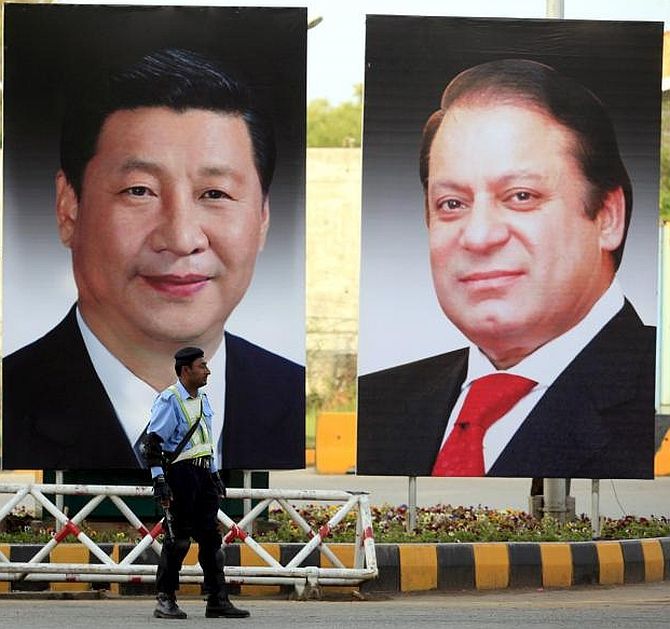'It is not possible for New Delhi to take sides between Beijing and Washington.'
Rajeev Sharma explains what is going on.

China is elated with India's public rejection of Washington's invitation of joint patrols by the US, Japan, Australia and India in the volatile South China Sea, but has warned New Delhi of the China-Pakistan axis.
Beijing wielded this double-edged sword at India through an editorial in its hardline English daily, the Global Times on March 10, the full text of which can be accessed here: https://www.globaltimes.cn/content/972945.shtml
India finds a deep focus in the Chinese newspaper's editorial in only one paragraph. Here it goes: 'India has already publicly refused the invitation of joint patrols from the White House. Having its own major power ambitions as well as a non-aligned foreign policy, it is not possible for New Delhi to take sides between Beijing and Washington. Apart from the triangle of China, the US and India, the latter also needs to consider the China-India-Pakistan strategic triangle.'
The clever work done by the Chinese newspaper is the fact that it has deliberately kept the key word 'the latter' vague because it can mean India and can also mean the US.
This is Chinese obfuscation at its best. China can always tell India that the editorial was meant to be US-bashing and not against India.
Yet, China has succeeded in issuing a direct warning to India which it knows won't be missed by the Indians! The master stroke is that the comment is from a Chinese newspaper after all, not a stated position of the Chinese foreign office.
This is how the Chinese have been conducting their foreign policy for decades. Whenever a hard-hitting message to any foreign power -- be it a friend or foe or frenemy -- is to be delivered, it is done through editorials and commentaries of the Chinese media, all of which is State-owned. At the same time there is complete deniability as far as the Chinese foreign office is concerned.
Through the Global Times editorial, China has sought to achieve another diplomatic objective: Ridiculing the US for failing to drum up an anti-China coalition so far despite its best and sustained efforts to make the South China Sea a flashpoint.
This point is important as it conveys that China has dug in its heels and not prepared to budge an inch over its growing assertiveness, both diplomatically and militarily, over the South China Sea issue.
China's growing confidence is not misplaced as apart from Japan no other power is willing to openly side with the US at China's expense.
The curt Chinese message to the Americans is two-fold as per the newspaper's quotes.
1. Regional countries will be reluctant to be US partners if a war breaks out between China and the US since China holds considerable countermeasures.
2. Forging a military alliance against China will not be easy. Development is the priority for countries in the region, while easing tensions and maintaining collaboration amid disputes are common wishes in the area. The more tensions the US stirs up in the waters, the more vigilance against it there will be.
There are two more recipients of China's warnings: The 10-nation ASEAN and Australia. While India has outrightly rejected the US offer of joint patrols in the South China Sea, the Association of Southeast Asian Nations, ASEAN, has been keeping an ambiguous attitude, steadfastly refusing to take sides in the US-China rivalry.
China has already taken note of reports that the fence-sitter Australia may opt for the US in the 'us or them' game being played in the region between China and the US.
Australia and the US have been engaged in serious negotiations for some time on having Australia as a long-range American bombers base to target China's land and reefs in the South China Sea.
The Global Times editorial has issued a naked warning to Australia thus: 'Canberra might have to deliberate whether the deployment will make it more safe. Instead, it could undermine the implementation of the free trade agreement between Australia and China.'
This has been China's strategy for decades: Using trade and economy as trusted insurance policies against anti-China military alliances the world over.
Rajeev Sharma is an independent journalist and strategic analyst who tweets @Kishkindha











 © 2025
© 2025